#words and language geekery
Explore tagged Tumblr posts
Text

(From this article on the history of the word OK/okay.)
I will now be signing off on all text messages to my queer peers with “OKKBWP” because DAMN.
14 notes
·
View notes
Text
"Arka"
Going to post this here since this could also be interesting to the Finnish learners on here (for more Ainu content, I post on @kkulbeolyeonghwa a lot!)
For people who have no idea what Ainu is, it's the one Japanese minority language the Japanese government recognizes. It's spoken in northern Japan, Hokkaido island.
The Finnish word arka and the Ainu word arka have almost exactly the same meaning.
In Finnish, it can mean shy or sensitive, but it also has a meaning of "sore" or "painful to the point you don't dare to touch". It comes from the Proto-Germanic *argaz. (The same root developed to be "eerie" in English)
Jalkani on vähän arka. - My foot is a bit sore. Haavani on vieläkin arka. - My wound is still sore.
In Ainu, the word arka means "painful" in general, ranging from "sore" to "tired" (of limbs) to actual high pain levels. Nobody knows where this word came from though. I tried looking at other local languages and finding a potential source but couldn't find anything.
Ku=cikirihi ponno arka. - My foot is a bit sore. Ku=pirihi naa arka. -My wound is still sore.
These words cannot be related to each other, but it's fun to see a similar thing in both languages!
Language geekery over thanks for listening.
#finnish#langblr#langblog#language#finland#suomen kieli#suomi#finnish language#vocabulary#ainu#ainu itak
107 notes
·
View notes
Text
Some more mythology geekery
Or: Let me talk Pan. (Or the other god I know a lot about.)
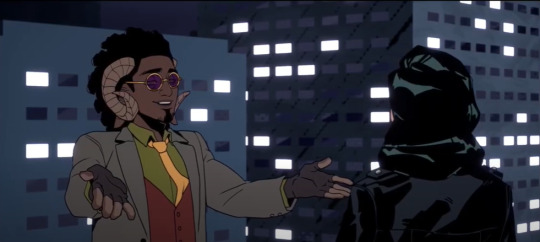
Folks found the stuff about old mythology and Persephone interesting... so let me do Pan. So, as I said: Persephone is a very old goddess who might well be one of the first in the Greek pantheon. But... She is not as old as Pan. Because within Europe Pan might in fact be the oldest god that we know about. In fact he very probably predates the ancient Greek religion and was just so popular, that the Greeks just decided to keep him in the pantheon.
How do we know that?
This is the moment, where this geeky twink squeals with excitement, because he gets to talk about proto-indo-european stuff. So, allow me for a moment: SQUEEEEEEEEE! 🥳
Okay. That needed out.
So, what you need to understand is that most mythologies from Europe, Asia and Northern Africa you know about are actually decendents of the same mythology. Talked about this in regards of the Roman Gods not being the Greek Gods. But... yeah. So, there was once this culture, who we call the Proto-Indo-Europeans and they had the great idea of putting wheels on things and the things behind horses and then got around a lot. And wherever they went, they brought their language and mythology with them, which is why the Indo-European language family is so fucking giant.
We can see some of their stuff shimmer through in common themes in mythology. Like, almost all the mythologies in Europe and Asia have a "sky daddy", aka a godly father figure who is associated with the sky. He is not always the big guy of the pantheon, but he is important in all the cases.
And while when we talk Greek, Egyptian, Roman or even Chinese and Hindu mythology we have a surprising amount of writing going on that dates back at times more than 3000 years... the earlier we go, the less writing there is.
Now, with Pan we have some stuff in Mycenean art and what not, that hints that he was around at least as early as 1700 BC, though - obviously - we do not really have written sources going back to this time.
But there is also the fact that... One of the earliest mythologies to split from the Proto-Indo-European one is the Hindu mythology. An the Hindu mythology has Pushan, who is not only associated with the same stuff (pasture, roads, travel, the wild and so on), but also has some goat imagery in older versions. Just like Pan. And if you look at the names P(ush)an you can see there is a parallel. Which makes those geeks who study stuff like that for a living fairly certain that those two once were the same god. A god they call *Péh₂usōn. And no, I will not go into Proto-Indo-European language right now.
The word "pasture" in English comes from the same Proto-Indo-European word, by the way.
Current theory goes, that Pan was actually worshiped by the pastoral people living in Greece before the advanced Greek civilization spread. And given that Pan was associated with so many aspects the folks were not giving him up. So, as it goes with pantheons... He just got integrated into the pantheon as was........ though he got split into two pieces. But... Gotta talk about his other piece tomorrow.
Maybe due to the age of Pan, but maybe due to him turning into mostly a god of wilderness, he tends to be a much more openly manecing deity compared to other gods. While most polytheistic cultures absolutely feature an aspect of: "Our thing is that we bribe gods into being nice with us, because those gods are so freaking dangerous," most of the pantheon gods are actually mostly cultured. Even if they are horndogs like Zeus.
Pan meanwhile is a god of the wild. He has this animal imagery (that probably all early gods had) still very present, he gets associated with all sort of wild behavior in humans, and of course the word "panic" comes from Pan. Because it is said that his scream could create panic in the humans.
Enough geekery, lets get back to Stray Gods. Because other than with Persephone's situation I am fairly certain that at least some of this was known to the creators, given the role Pan plays as someone who is not quite inside of the Chorus and acts more as an outsider to it.
83 notes
·
View notes
Note
I LOVE BE WLL AND BESKAR IM RWADING IT RN ON AO3 I LOVE IT I LOVE YOU
Also can I say you being a linguist is so incredibly cool???
THANK YOU 🙏🏻 I’m glad you’re enjoying it! I love you for reading it!
I’m constantly surprised by how many people think my linguistics geekery is cool! Mando’a is such a beautiful language, and the way its constructed makes it easy to create new words once you understand it the grammar 😌

8 notes
·
View notes
Text
Several names in the LOTR are derived from Old English words, either directly taken from Old English, or applying regular sound changes to Old English words, or taking Old Norse words
I wonder if any translators have taken the same route by using older forms of the language being translated into (or related languages as with the use of Old Norse) in the same way
I would guess probably not. Because for one, that would be a lot of extra work, and for another, most readers would probably be confused about why names were changed
Still, it would be a Tolkien-worthy level of linguistic geekery
8 notes
·
View notes
Text
#no idea if this will work#words and language geekery#bilingual#representation matters#english is batshit crazy#english is the language that mugs you in a back alley for loose phonemes
0 notes
Text
Hey, who remembers when I used to post language geekery and made a whole conlang for the Homestuck trolls? I know that was a literal decade ago. but I’m starting to think sort of semi-seriously about picking up an old worldbuilding project with some unwritten stories attached to it. I dusted off a conlang that I actually still quite like and plan to do some more work on it. So, I may start posting about this language here, and possibly may write a story that’s connected to the conculture it goes with. Here is what I have of it so far.
The Doylist history of this conlang is that I was reading Hitchhiker’s Guide to the Galaxy a very long time ago, and got to the part where there’s a paragraph where a bunch of time travel shenanigans are described in the most confusing way possible using some novel combinations of English modal verbs. And I thought: I bet if time travellers existed in the real world, they would have a language that was specifically designed for making it easy to talk about time travel. What would that language look like? And I decided the best way to do it would be to mark tense on the nouns. When all of your nouns can be different tenses, it’s easy to talk about things that are at different points in their personal timelines relative to you in the same sentence or as part of the same action. This is also super useful for talking about other kinds of regular actions that don’t require everything involved to be colocated, and thus can span several temporal locations even without time travel. For example, “I don’t like the way you used to be” is an action that involves a present tense participant and a past tense participant. With a language that marks tense on the nouns, you could write this as “I-PRES don’t like you-PAST”, and it takes exactly as many words to say as “I don’t like you”, and the same is true for any combination of participants and tenses, some of which can get quite wordy in English.
The Watsonian history of this conlang is that it was created in-universe as a conlang by the all-female priesthood of a Goddess who had given them the power of time travel in order to get their society, the Cheanya, out of a tight spot where they would have all been killed by a neighboring culture. (Or, that’s what they say happened, anyway.) The priesthood carefully polices the use of time travel and the technology required to do it, but frequently use it themselves and can also use the technology to audio- and video-chat across times and timelines. So, they needed an artificial language that wouldn’t change over time with which to talk to priestesses at other points in time, that they could use to talk about time travel. The language, like the time travel technology, is a closely guarded secret of the priesthood. It’s not a language anybody actually speaks natively, although it would have been based on the native language of the creator back when it was invented. The country this takes place in is on a large island about 1/3 the size of Australia in the southern hemisphere, between two the two sides of a much larger continent that actually goes over the south pole and continues halfway up the other side of the world. The language is called QuCheanya, which technically means “the people’s language” or “the Cheanya’s language”, but this is of course just a bit of propaganda since the vast majority of the Cheanya people do not actually speak it.
The language has 25 consonants and 14 vowels and diphthongs, but only allows CV syllables, which works out to exactly 350 possibly syllables, a couple hundred more than Japanese. It has obstruents in four places of articulation: bilabial, alveolar, velar, and uvular, and five series’ of such obstrunts: voiceless stops, voiceless fricatives, and voiceless affricates at all four PoAs, and palatalized voiceless stops and palatalized voiceless fricatives at the non-uvular PoAs. It has bilabial, alveolar, and palatal nasals, alveolar and palatal laterals approximants, /r/, and /j/. For vowels, it has a basic set of six monopthongs, which are the standard five vowels plus a phonemic schwa. Then it has a series of four diphthongs ending in /i/, and a series of four diphthongs ending in /ə/. Altogether this is:
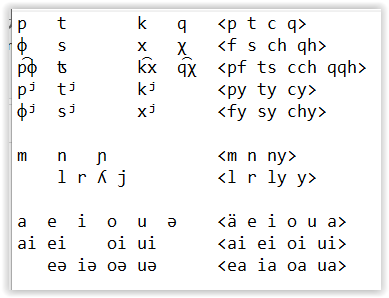
with the romanization written on the right hand side. Stress is always on the penult, if the word is four or more syllables long there will be a secondary stress on the preantepenult. All of the voiceless obstruents are voiced intervocalically, which is where they are all of the time that they are not the first sound in the word, due to phonotactic constraints.
The writing system is a syllabary, which is the usual way that writing systems work in this part of the conworld. Each character consists of a square frame which indicates by its shape the PoA of the onset of the syllable, to which can be attached diacritics indicating affrication and palatalization. The interior of the character is not featurial. The character can be followed by diacritics indicating a diphthong. Some characters have possible variants.
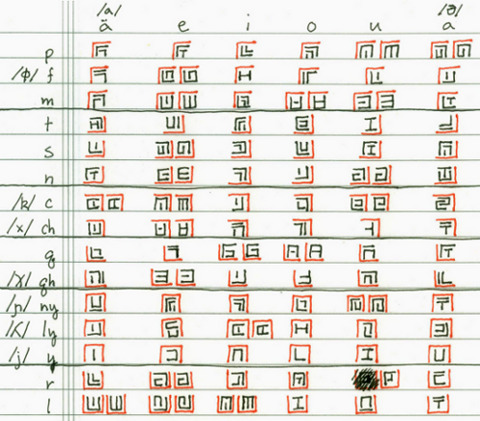

The frames are written in red ink above - this is how writing is done traditionally, for official purposes. There are different styles - you can make all of the frames red, just the ones at the beginnings of words, or just the ones at the beginnings of sentences. Naturally, it’s a big pain in the ass and it’s not done unless this piece of writing is going to be kept around for a while. However, since the language is basically proprietary property of the priesthood, it’s mostly used for official studies and research and documents done by the priestesses, and not so much used for everyday things like shopping lists anyway.
This is a largely head-last language with most of the morphology on the nouns. It would probably be classified as SOV, although it’s more correct to say it is Topic-Focus-Verb. Quantifiers and numbers precede adjectives precede nouns, adverbs (which are identical to adjectives except that they modify verbs) precede verbs, postpositions follow their objects. The one head-first part of the language is that there are a few nominal compounds that are head-first, like for example QuCheanya as mentioned above. However, these compounds are not very productive.
Nouns are marked for case, number, and tense.
Tense is indicated by a single consonant: q for past tense, c for present tense, and p for future tense. Tense strictly refers to the noun’s progress along its personal timeline, as opposed to the global world timeline. The global world timeline is generally referenced using nouns referring to particular days/dates/times or just generally “past” or “future” in the locative case, however, there are special tenses that are used if an object is in the past or future of its timeline relative to the speaker, but is not in the past/future of the global timeline relative to the speaker. Say, if you time travel into the past from a future point, you as you were before the time travel is in the past of your own personal timeline, but in the future of the global timeline. So in this case you would, instead of using q to indicate past tense, use qqh to indicated “past displaced” tense, and in the reverse case would use pf to indicate “future displaced” tense. The displaced tenses can also be used somewhat more laxly in most situations where an object or a person is considered to be in the “wrong” temporal position for what it should be due to time travel - this is naturally fairly subjective.
If the noun is the topic of the sentence, it always appears first in the sentence regardless of its role, obligatorily marks tense, and then has the topic ending -ei (singular) or -eya (plural) following the tense consonant. For every other noun in the sentence, tense marking is optional, and leaving it off indicates that it has the same tense as the topic noun. For non-topic nouns, the optional tense is a syllable consisting of the tense consonant followed by -a, which is followed by a case-and-number marking syllable, which is one of the following:
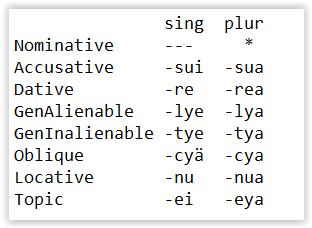
The nominative singular is unmarked. Plurals always end in -a, nominatives ending in -e -i -o or -u add -a to form a diphthong, words ending in -ä change the -ä into an -a, words ending in diphthongs of the form -Vi transform into -Vya, and words already ending in -a do not change. Nominative is for subjects, accusative for direct objects, dative for indirect objects. Alienable genitive is marked on the possessor noun (which precedes the unmarked possessed noun) and is used for things that are alienably possessed, such as belongings and more abstract things such as thoughts and ideas. Inalienable genitive is used for inalienably possessed things, such as body parts and family members. Locative is used generally to mean “in/at/on” for both physical places and temporal “places”, and also with objects of postpositions indicating location in space or time, oblique is used with the objects of all other postpositions.
Pronouns are inflected for case and number. If a tense needs to be used with a pronoun, the tense syllable (tense consonant plus -a) precedes the pronoun.

So “you” (singular) as the topic, in the present tense, would be written as “ca pfei”.
Verbs are generally invariant, although there are many verbs that are formed by prefixing a postposition onto the front of a verb to change its meaning, similar to how this happens in Latin with prepositions.
There are, however, two particles that can come after the verb in a sentence - an aspect-marking particle and a future relevance particle. There are two possible aspect particles, sei, marking habitual aspect, and cä, marking perfective. Unmarked sentences with no particle are by default in progressive aspect. The future relevant particle is rui, which is actually identical in form to the postposition meaning “from”. This is used to indicate that the action has relevance to a (relative) future time, and can be used in similar situations to English constructions like “I have finished eating”, which is different than “I finished eating” in that implies something about the present state of things, or “I will have finished eating” which is a future action that has relevance to a further future time. It can also be used with present actions deemed relevant to the near future.
Verbs that take clauses as complements (think, want, say, know, etc.) are simply put after the clause, with no modification to the previous verb. The two sentence ending particles mentioned above cannot, however, be used with a verb that is part of such a complement clause. When the complementized verb is yai, the general placeholder verb that usually means “be”, “exist”, “do”, or “happen”, depending on context, yai is simply deleted.
I did some of the Conlang Test Sentences that were posted a long time ago on the Zompist BBoard in this language. The full list of sentences is here: https://cofl.github.io/conlang/resources/mirror/conlang-syntax-test-cases.html - I will probably do more of these later as I continue to flesh out the conlang. Here are the first 22, with interlinear glosses, to give you a practice demonstration of how the language works:


tira is an adjective/adverb that means “near”, but in a temporal sense. With a future tense noun it means “soon”, with a past tense noun it means “recent/ly”, and with present tense it means “right now”. It’s related to a similar adjective/adverb tile, which means “near”, but spacially.
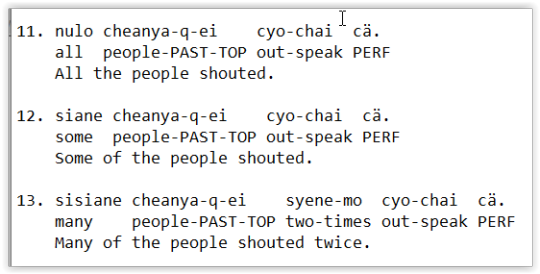
sisiane is a partial reduplication of siane. QuCheanya has some limited partial reduplication in closed-class word categories.
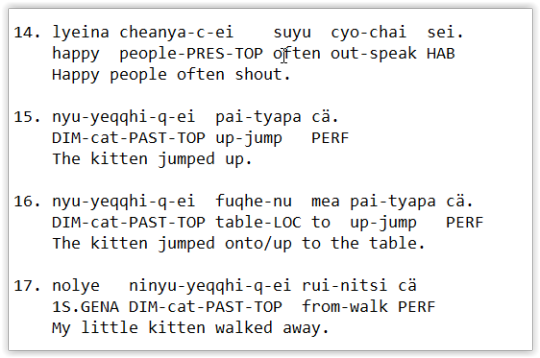
nyu- is a diminutive that is usually used to form words for baby animals. Here in sentence 17, ninyu- is a partial reduplication of it to mean a little baby animal.
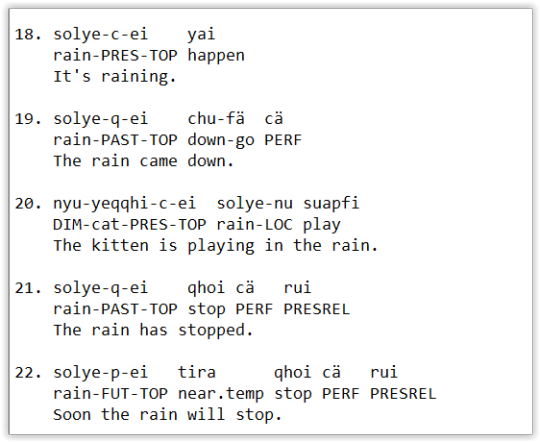
Here we have tira meaning “soon”, and qhoi taking a sentence complement (except the verb was yai, so it was deleted).
15 notes
·
View notes
Text

Omg thank you!!!
Seriously, the extremely warm reception you all in Phyrexia fandom are giving me, and the tolerance of my older friends for my intense geekery about the language, is HEALING MY SOUL y’all do not even know.
I have so much remembered shame over being different, especially over things like reading dictionaries and geeking over words. It’s so amazing to me to know I can go online now and have so many people just be like “hey, cool.”
Thank you guys so much.
7 notes
·
View notes
Text
The road must be trod, but it will be very hard. And neither strength nor wisdom will carry us far upon it. This quest may be attempted by the weak with as much hope as the strong. Yet such is oft the course of deeds that move the wheels of the world: small hands do them because they must, while the eyes of the great are elsewhere.
- J.R.R. Tolkien, The Lord of the Rings
(Emphasis mine)
you know what gets me about lord of the rings? evil is defeated by people who choose to fight against it without possessing absolute, or even very much, conviction that they can actually win. all the converging story threads that lead to the happy ending are carried out by people who are far, far more convinced that they will fail than that they will succeed, who had only the frailest, most foolish hope, who had blind faith and frequently wavering hearts not peace or ease or certainty.
middle earth isn’t saved because no one faltered or came close to despairing or who sank to their knees in weary defeat. it’s not saved by pride or conviction or even strength. it’s saved because enough people do what they have to do even if they have to do it in the darkness. in the dust. with the ashes of hopelessness and bitterness in their mouths. because enough people took another step. Frodo, Sam, Gandalf, Aragorn, Theoden, Boromir, Faramir, Merry, Pippin. And many don’t. For every hero there is someone who gives into the “reasonableness” of despair—Saruman, Denethor, Grima, even Gollum—but enough. Enough people said “it doesn’t matter if we lose, I will keep fighting” and then they do.
And that GETS me. It is the most hopeful thing about the lord of the rings to me. There is so much that sums up its spirit, so many beautiful quotes and moments, but to me it’s never been the most famous of the quotes about hope and love that hit me hardest but a line from the films. Before the battle for minas tirith, one of the soldiers says “we cannot defeat the armies of Mordor” and Theoden answers “no. but we will meet them in battle nonetheless.”
And I—That is the spirit that leads to the conquering of evil when it comes down to it, when we’re talking about the part played by humanity alone in the fight against evil. Not the conviction you’re going to win, not farsightedness into a perfect future, not perfect inner peace or certainty. But acceptance of the real possibility of defeat, of that defeat being more the reality, the future, of your life than the victory, and then doing the damn thing anyway because goodness is worth fighting for even if you lose.
34K notes
·
View notes
Photo

In a sea of white guys with microphones, finding the right flavor of iconoclastic irrelevance can be a daunting task. Let us simplify your stressful, modern life, by making the choice for you! Have you ever been tempted to add cream, lime juice and absinthe to a cocktail? Do you love regaling friends, family and strangers with useless tidbits, like the fact that one of the filthiest words in the English language is also one of the oldest? Is some of your favorite music sprinkled with weird sounds and/or theremins? Then join us weekly (Sundays @ 12pm GMT or Thursdays at 12am GMT) on Mad Wasp Radio for THE CLOCKWORK CABARET, hosted by your favorite weird aunties and professional flibbertigibbets, Emmett Davenport and Lady Attercop, aka That Darling DJ Duo. Sure, they’re old enough to know better, but they’ve never let that stop them before. They’ve got a wide assortment of music, vintage cocktails, weird history, geekery, horrible accents, and fake holidays they’d like to share. Remember, here at the Clockwork Cabaret, it’s not work we do, it’s LOVE. Episode archive available at: http://clockworkcabaret.libsyn.com http://www.mixcloud.com/thatdarlingdjduo https://open.spotify.com/show/2zmx88W3fcP5Uz3aQm3e6T https://www.instagram.com/p/CkdGZVcOHW-/?igshid=NGJjMDIxMWI=
4 notes
·
View notes
Text
Reference Guide to Tags
#mine - original posts, anything I’ve added to, etc
#tips - useful info to reference
#bujoinspo - does what it says on the tin!
#film - anything to do with film. Once you’re in this tag you can find specific ones to search, eg Italian cinema.
#research ideas - interesting threads to follow, or topics to practice being a pretentious academic with.
#essay topics - some crossover with research ideas, but specific to essay ideas.
#playlists - study music
#dark academia - aesthetic da delights
#languages - anything to do with learning foreign languages
#reading list - books to read!
#productivity - tips on how to be productive
#motivation - how to motivate myself, motivational quotes etc
#cv - everything to do with cvs, resumes, personal statements
#how to study - tips on study and revision methods
#linguistics - word geekery incl. me fawning over etymology
#illustration - illustrated pics and gifs
#onmydesk - the realm of extra beautiful desk setups
#notespo - all things notetaking - how to do it, layout examples, + more
#study space - my favourite pics of study spaces
#help I’m overwhelmed - how to get your shit together
#organisation - how to stay organised and on top of things
#this is mostly for my own use#because I save a ton of stuff in here and then can never find it!#mine#tips#bujoinspo#film#research ideas#essay topics#playlists#dark academia#languages#reading list#productivity#motivation#cv#how to study#linguistics#illustration#onmydesk#notespo#study space#help I’m overwhelmed#organisation
42 notes
·
View notes
Text
Tolkien would be so proud to have raised such a flock of linguistic nerdlings.
Legolas pretty quickly gets in the habit of venting about his travelling companions in Elvish, so long as Gandalf & Aragorn aren’t in earshot they’ll never know right?
Then about a week into their journey like
Legolas: *in Elvish, for approximately the 20th time* ugh fucking hobbits, so annoying
Frodo: *also in Elvish, deadpan* yeah we’re the worst
Legolas:

#this is the tolkien fandom at its finest#jrr tolkien#lotr#elvish#fictional languages#words and language geekery
274K notes
·
View notes
Text
WELL I SURE AM DOING THIS NOW
Good omens, Human AU, regency-ishAU though I may need to shift things a little later by a decade or two for Obscure Science Geekery Reasons.
working towards Beelzebub (”Beatrix”)/Anathema
Unbetad, first draft, need a beta, who wants to beta for me, I’ve got 1 more chapter 90% written and another started and rough plot outline god/satan/someone help me.
Chapter 1: In which a will is read.
The death of Lucius Morningstar was not unexpected. He had been in ill health for years, and his final decline had occurred over a number of months. His daughter, Beatrix, felt very little of anything at the moment Dr. Ligur pronounced her father dead. She felt she had mourned him already. And as she sat down the next day as the will was read, she felt very little then as well. She felt no excitement or anticipation at taking legal possession of her father’s estate. She had been acting as her father’s agent in most things for years. To have the estate de jure as well as de facto would mean very little change in her life.
Half an hour later, she was not nearly so placid.
“Crowley, you traitor, you utter snake,” Beatrix snarled at her cousin, as soon as they had retreated from her father’s study where the will was read to her own study*.
*[it was intended as a sitting room, and might have been if she had been a different woman. But she had been running the business of the estate out of it for the past fifteen years, and furnished it accordingly. ]
Anthony Crowley was a tall, gangly sort of man, but now he seemed hunched in on himself. “Beez, I didn’t know, I swear!” he protested, but Beez advanced on him, backing him into a corner between the globe and the liquor cabinet.
“Didn’t know- he’s your ward! A son, a bastard son, and you knew about him, secreted away wherever you’ve hidden him, he’s been your ward this whole time!”
“You father swore me to secrecy,” Crowley protested. “And I didn’t think he’d be the primary heir! I certainly didn’t know about the dowry! He never even breathed a hint of that to me!”
Beatrix sank slowly into the chair as the consequences of that part of the will hit her again. Bad enough to have her estate, the estate she’d been doing the running of for years, been master of in all but name, stolen out from under her by some bastard child of eleven. But then, to have what she had been left, tied up in such a way. If she were not expecting the entire estate, if her brother had been legitimate or if she had even known of his existence before today, she would have considered two thousand pounds a year a very generous bequest. Two thousand a year would be enough to give her freedom.
It would be all these things, if it had been given to her outright.
Instead, her father had left her nothing. Her two thousand pounds a year was to be settled on her at the time of her marriage- to be controlled by her husband only devolving to herself and her children upon said husband’s death. And until then, she had nothing, nothing but the charity and good nature of her brother. Or, for the next ten years, of her brother’s guardian: her cousin cringing before her.
Crowley sat down in the chair across the desk from her, and did not meet her eyes. “I thought it was for Adam,” he said.
“What?”
“The two thousand pounds a year. Mr. Morningstar had me arrange the accounts in advance, once he knew his head was near. The trust, the two thousand pounds- I thought that was Adam’s share. I thought that was what he was keeping secret.” Crowley was growing agitated. “He knew I thought that. He let me go on thinking that on purpose. Because I suppose he knew the limits of my loyalty to him. And how much loyalty I owe you.”
“You didn’t see the will?” Beez said blankly, feeling exhaustion overcoming her rage.
“I didn’t think it odd that he had his other lawyer draft it up- it was only sensible, given that I’m an heir too, if only a minor one.” He smiled bitterly. “And I was so busy, after all, running all over the county doing your bidding. I’ve been working for you, not for him, Beez. And he knew it.”
Several minutes passed in silence, Beez trying to make sense of her racing thoughts as her whole future had been turned upside down. It was true- as she had taken on more and more of her father’s duties, Crowley had been indispensable to her. He was useful not only for his skill at the law, but for those matters that required good judgement, delicacy, subtlety and subterfuge. Unlike some other family retainers, she never felt he respected her less for her sex.
Which was why his betrayal felt like such an awful blow.
“I suppose you’ll be bringing him to live here now,” Beez said eventually. “Adam. Where have you been hiding him anyway?”
“He’s being fostered in the village of Tadfield.”
Oh, that devious snake. “Tadfield,” she commented mildly. “I see. I did think you were spending more time personally overseeing the new chalk pits than strictly necessary.”
Crowley looked guilty at this. “Did you? You never said anything. And they’re doing well, I wasn’t neglecting them, you’ve seen the figures, the profits-”
“This isn’t about the bloody chalk pits, Crowley,” Beez snapped. “And of course I didn’t say anything. I presumed you spent so much time in that village because-” Here she cut herself off, and nodded towards the door, hoping to indicate Mr. Ezra Fell, the curate of that parish, who was wisely waiting in the hallway. She knew, or rather strongy suspected, that Crowley had taken the man as a lover several years ago; what’s more, she was fairly certain that Crowley knew of her knowledge, or rather of her strong suspicions. But “because you’ve been fucking the curate” was not a thing to be said aloud*, not even behind closed doors where nobody** could hear. There were some things it was unwise to make a habit of saying.
*[not due to the coarse language- Beatrix knew there was a time and a place for such words, and in her own study in front of her cousin was one such time]
**[except, perhaps, the curate himself, but even if he had his head pressed to the keyhole it was of little import as Beez fully expected the conversation in full to be related to him at a later time.
Crowley seemed to understand. “Mr. Fell recommended the family, actually,” he said. “And he’s been tutoring the boy.”
“Did he know? Who the father’s child was, I mean?”
“I didn’t tell him,” Crowley said, and Beez glared at him until he added, “He guessed, though.”
“Does everyone know? How large is this conspiracy?”
Crowley laughed bitterly. “No, no, as far as I can tell, the general opinion is that Adam is my own son and that I’ve done a particularly poor job of trying to hide it. I trust you will understand why I did nothing to discourage that rumor.”
She did understand. That was besides the point. “Crowley. Who knew.”
”Mr. Hastur knew the truth from the start. Dr. Ligur as well, he attended the child’s birth and the mother’s death afterwards. Nobody else that I know of.”
“That’s something, at least,” Beez allowed. At least she’d not been made a fool of.
“I don’t want to move him here.” Crowley looked at her now, met her eyes for the first time since she’d cornered him into the room. “ His family- the Youngs, who’ve been raising him- I won’t take him away from them. He’s happy there. He’s far happier than either of us were at that age.”
“Fine,” Beez said. “I’d rather not have the bastard running around underfoot if I don’t have to. Not that I have any say in the manner.”
“Of course you have a say, Beez. I promise. Nothing has to change,” Crowley said. “You’ve been running everything here for years, for all that it was in your father’s name. I’d be a fool not to let you carry on as you have been.”
“Let me,” Beez repeated venemously. “You shall not let me do anything. This house and these lands are mine, and I will do everything in my power to claim that right.” She took a steadying breath, and stood up, rising to her full height (meagre as it was). “Get out of my study.”
5 notes
·
View notes
Text
Prologue
read it on the AO3 at https://ift.tt/38031aA
by Fyre
It wasn’t that it was one of his favourites, but Tracy had surprised him with a ticket for the show. “The RSC,” she exclaimed gleefully, as she presented it to him. “Heard they were putting something on. Knew you’d want to see it.”
Words: 2385, Chapters: 1/1, Language: English
Series: Part 1 of A Little Kindness
Fandoms: Slow Show - mia_ugly, Good Omens - Neil Gaiman & Terry Pratchett
Rating: General Audiences
Warnings: Creator Chose Not To Use Archive Warnings
Characters: Avery Fell (Slow Show), Anthony J. Crowley (Slow Show), Tracy (Slow Show)
Additional Tags: Pre-Canon, Alternative Perspective, Shakespeare geekery ahoy!
read it on the AO3 at https://ift.tt/38031aA
2 notes
·
View notes
Text
"Tony.2, where we at?"
"800 Fuckin Punks Boulevahd."
"Deploy our Little Friend."
"HEY GOOMBAH" *fires*
What’s up with AI in media having British accents? Just once would I like to see one with a Brooklyn accent
968 notes
·
View notes
Link
by stellahibernis
“You always wanted to come to Paris. This isn’t much like you pictured, though, is it?”
“No, it really isn’t. I never had that clear an image of the city itself, I only imagined bits and pieces. The Notre Dame. The Louvre.” Steve grinned. “It’s surreal, I’m here, and it turns out the Louvre is empty.”
“You can come back during peace, when they’ve brought everything back,” Bucky said, and Steve immediately perked up.
“I hope we can,” Steve said, and bumped Bucky’s elbow with his. “Where are we going, anyway?”
Steve and Bucky take a night for themselves in the newly-liberated Paris.
Words: 4601, Chapters: 1/1, Language: English
Fandoms: Captain America (Movies)
Rating: Explicit
Warnings: No Archive Warnings Apply
Categories: M/M
Characters: Steve Rogers, James "Bucky" Barnes
Relationships: James "Bucky" Barnes/Steve Rogers
Additional Tags: Captain America: The First Avenger, World War II, and a future coda, Not Avengers: Endgame (Movie) Compliant, Fluff and Smut, and some art geekery, In Paris, Explicit Sexual Content, Captain America Septender Challenge 2019
11 notes
·
View notes